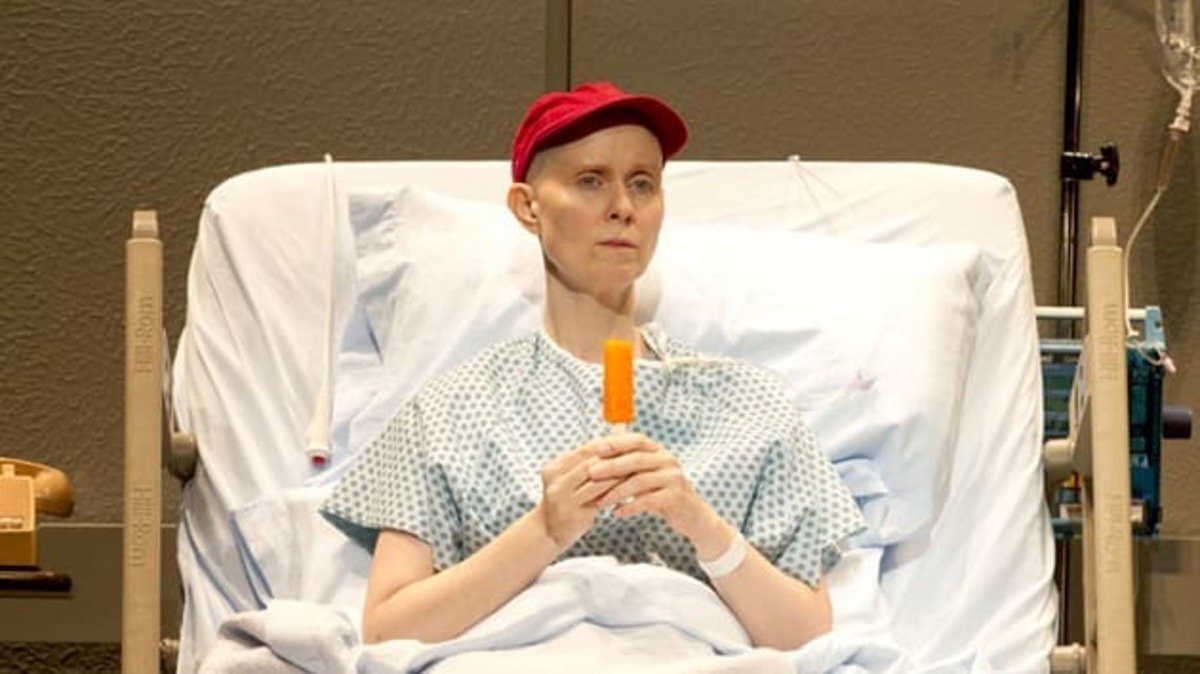Why the Play ‘Wit’ Made Me Cry So Hard
Photo by Joan Marcus
Originally published on Show-Score.com
View this post online
Some plays hit us harder than others. One theater lover describes her very personal response to Wit.
I didn’t cry a lot when I was sick. I was too busy, stressed, and scared to allow myself to break down in tears. It was almost five years later, when I saw Margaret Edson’s Wit on Broadway, that I experienced cathartic sobbing about having had cancer. And once I started, I didn’t stop. The moment Cynthia Nixon walked onstage, I began to cry and continued to do so for the entirety of the 100-minute play.
I knew I would be moved deeply by Wit, which tells the story of Vivian Bearing, an English professor fighting a losing battle against ovarian cancer. How could I not be? Nixon, a cancer survivor herself, was playing the leading role, directed by fellow survivor Lynne Meadow. I was confident Edson’s play would be a sincere portrayal of someone’s experience with the illness rather than the saccharine depictions at which I often roll my eyes.
Stories about cancer, especially about women battling it, are often problematic to me. I find the plots formulaic and predictable, often concluding with a declaration that the patient “knows what’s important now.” I certainly didn’t experience that while going through treatment. But with Nixon, an incredibly sincere and empathetic actress playing the woman fighting the disease, I was confident those clichés would be avoided.
With a few years and some emotional distance between my own diagnosis and Wit, I thought I was prepared to see the play. Then Nixon walked onstage, dressed in a hospital gown with a baseball hat covering her shaved head, and spoke her first line.And the tears began.
I’ve never been much of a crier at shows. A few tears have welled up here and there, especially during Sondheim musicals. I guess I’m too self-conscious and worried that I’ll distract people around me, so I’ve always held back from crying in public. So actual crying — even for a moment, let alone throughout an entire play — had never happened before that night. I’d stored several packets of tissues in my purse, but I didn’t think they’d actually be needed. They were. So were the ones my friend had brought, which she quietly handed me throughout the show.
One of the reasons I love Nixon’s acting is her ability to appear defensive while still allowing moments of vulnerability to show. (During the “Sex and the City” heyday in my college years, I was told many times that I’m a Miranda.) That contradictory combination of emotions — all too familiar to a fellow patient — was apparent from the first word she spoke as Vivian.
It was easy to lose myself in her story, but it also brought back memories of my own: diagnosed with stage three thyroid cancer at 23 at the same time my workplace was facing bankruptcy, I rushed into treatment so I could complete the surgery and radiation treatments before I lost my health insurance. I was so focused on the ticking clock that I barely processed what was happening. Saying, “I have cancer” became automatic, even robotic, with almost no emotion behind it. I didn’t cry then, because I didn’t have time to. And when I had finished my treatments and could move on with my life — at least physically — I didn’t want to.
I never would have thought those tears were still there, but they were. And while watching Nixon in Wit, I finally found time to cry.

